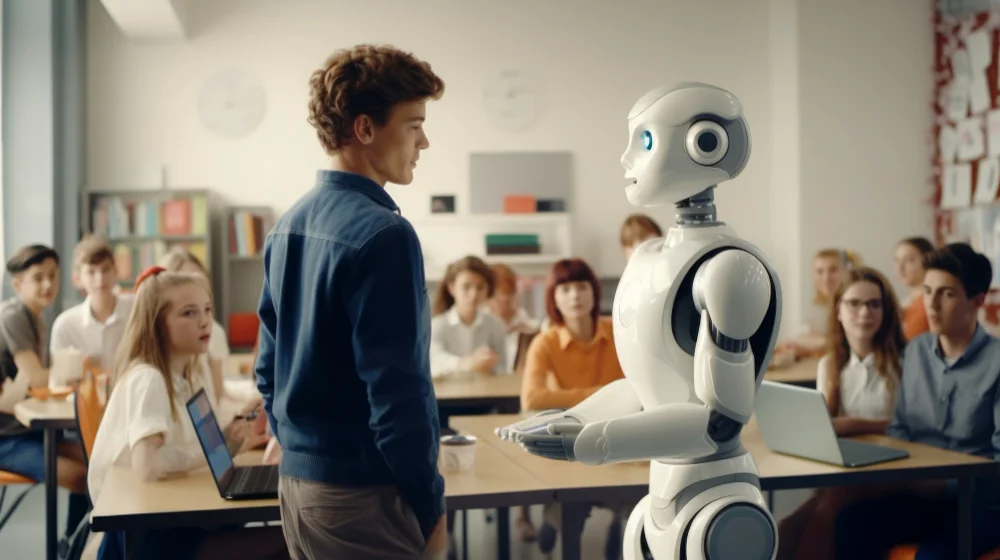The idea that AI teachers run the school may sound futuristic, but technology has already transformed how students learn and how classrooms function. Artificial intelligence can adapt lessons to individual needs, automate administrative tasks, and even guide learning strategies.
Yet, the vision of AI running a school raises important questions about trust, ethics, human roles, and long-term effects. In this article, we will explore how AI can reshape education, what challenges it brings, and what guidelines schools must follow to adopt it responsibly.
What It Means When AI Teachers Run the School
When AI teachers run the school, the classroom looks very different. Instead of human teachers being the sole knowledge providers, intelligent systems manage instruction, assignments, assessments, and performance tracking. Human educators become mentors and guides, focusing on emotional support and complex learning.
AI in education means:
- Intelligent algorithms personalize learning paths.
- Automated grading and real-time feedback save time.
- Data analytics detect learning gaps early.
This transformation has the potential to make education more efficient, accessible, and personalized, but it also carries risks if not implemented with balance.
How Roles of Teachers and Students Change

When AI teachers run the school, the roles of both teachers and students evolve significantly. AI takes over routine tasks, while humans focus on creativity, empathy, and oversight.
Teachers’ Role
Teachers transform from knowledge transmitters to facilitators and mentors. Instead of spending hours on grading or paperwork, they focus on guiding students, nurturing emotional intelligence, and ensuring AI systems are fair and effective. This change requires them to develop new skills such as digital literacy, ethical decision-making, and data interpretation.
Students’ Role
Students gain more independence in their learning journeys. With AI giving instant feedback and personalized pathways, they can progress at their own pace.
This promotes autonomy and adaptability but also demands greater responsibility, self-discipline, and motivation. Without proper human guidance, some students may struggle with the increased freedom.
Implementation Strategies for AI-Driven Schools
To make AI teachers a reality, schools must adopt strategic approaches. A sudden shift is risky, but gradual integration makes the transition smoother.
A few essential strategies include:
- Pilot Programs: Start small with subjects like math or language.
- Hybrid Learning: Combine AI teaching with human supervision.
- Bias Testing: Regular audits of AI systems to ensure fairness.
- Privacy Protection: Strict laws and security for student data.
These steps ensure that AI enhances learning rather than replacing the human essence of education.
Ethical, Social & Legal Challenges When AI Teachers Run the School

AI in schools raises critical questions about fairness, access, and accountability. If algorithms determine grades or career advice, transparency becomes vital. Students and parents deserve to know how AI reaches decisions.
Ethical concerns also include bias. If AI is trained on limited data, it may favor certain groups over others. Socially, there is the danger of widening inequality, as wealthier schools may afford better AI systems. Legally, governments must regulate AI in education to protect student rights.
Key Actions Needed:
- Clear rules for student data collection and storage.
- Accessibility for students with disabilities.
- Oversight boards to evaluate AI systems.
- Policies to prevent discrimination in AI-based grading.
Long-Term Impact of AI Teachers Run the School on Society
In the long term, when AI teachers run the school, education will focus less on memorization and more on higher-order skills. Students will need creativity, collaboration, and problem-solving abilities. To support this shift, schools may also adopt advanced digital solutions, including the best AI tools for editing documents, which can enhance both learning and administrative efficiency.
Economically, governments may save costs through automation, but this could also reduce traditional teaching jobs. Retraining educators into supervisory roles will be crucial.
Socially, AI-driven schools will demand trust. Parents and communities must feel confident that AI decisions are fair, transparent, and aligned with human values. Without trust, adoption will fail.
Best Practices for Schools Adopting AI Teachers
For schools aiming to integrate AI responsibly, a set of best practices should be followed:
- Train teachers in AI supervision and data literacy.
- Keep humans in control of final grades and discipline.
- Ensure inclusivity for diverse learners.
- Regularly audit AI for bias and errors.
- Involve parents and communities in planning.
Checklist for Schools
- Transparent policies on data use.
- Continuous staff training.
- Clear complaint and correction systems.
- Funding for infrastructure and device access.
- Ethical review boards for decision-making.
Will AI Teachers Run the School or Replace Humans?

It is unlikely that AI will fully replace teachers in the near future. While machines excel at grading, scheduling, and personalizing lessons, they lack empathy, creativity, and cultural understanding.
Human teachers will continue to provide the emotional intelligence and mentorship that AI cannot replicate. The future is not replacement but partnership.
Preparing Students for an AI-Powered Future
To prepare students for schools where AI teachers dominate, the focus should shift toward digital literacy, ethics, and adaptability.
Students should learn not only how to use AI tools but also how to question them. Critical thinking about algorithms will be as important as learning math or science.
Conclusion: Will AI Teachers Run the School?
The possibility that AI teachers run the school is both exciting and challenging. AI can personalize learning, reduce administrative burden, and improve efficiency. But without ethical safeguards, transparency, and human oversight, it risks harming the very students it aims to help.
For educators and writers exploring these shifts, using reliable SEO writing tools can also help present content in a clear, optimized, and impactful way.
The future lies in hybrid models where AI empowers teachers, students, and communities, ensuring education remains deeply human.











